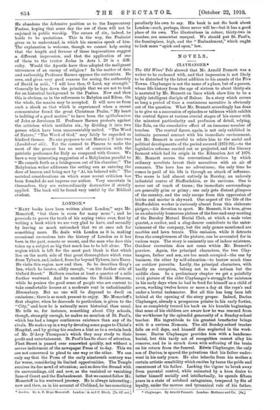LONDON.* "MANY books have been written about London," says Mr.
Moncrieff, " but there is room for many more " ; and he proceeds to prove the truth of his saying twice over, first by writing a book which we are very glad to have, and secondly by leaving so much untouched that we at once ask for something more. He deals with London as it is, making occasional excursions into the history of London as it has been in the past, remote or recent, and the man who does this takes up a subject so big that much has to be left alone. The- region which is left for the most part blank is that which lies an the north side of that great thoroughfare which runs from Tyburn, and, indeed, from far beyond Tyburn, into Essex. He visits this region now and then. So he describes Gray's Inn, which he locates, oddly enough, " on the farther side of Oxford Street." Holborn reaches at least a quarter of a mile further westward. And he mentions the British Museum, while he praises the good sense of people who are content to take comfortable houses at a moderate rent in unfashionable Bloomsbury. But no one will be disposed to dwell on omissions ; there is so much present to enjoy. Mr. Moncrieff's first chapter, when he descends to particulars, is given to the -" City," and here he is naturally more historical than usual. He tells us, for instance, something about City schools, though, strangely enough, he makes no mention of St. Paul's, which has had a longer continuous existence than any of its rivals. He makes up in a way by devoting some pages to Christ's Hospital, and by giving-his readers a hint as to a certain book of Mr. D'Arcy Thompson's Which they may study to their profit and entertainment. St. Paul's has its share of attention. Fleet Street is passed over somewhat quickly, not without a severe indictment of the newspaper Press of to-day. This we are not concerned, to plead to one way or the other. We can only say that the Press of the early nineteenth century was .:far worse, considering its limited opportunities. The Temple 'receives its due meed of attention; and so does the Strand with its surroundings, old and new as the vanished or vanishing Inns of Court and the Embankment. But wecannot follow Mr. Monerieff in his westward journey: He is always interesting ; now and then, as in his account of Clubland, he has something
• London. By A. B. Hope Moncrieff. London :' A. end C. Black. [%. CA net.]
peculiarly his own to say. His book is not the book about London—such, perhaps, there never will be—but it has a good place of its own. The illustrations in colour, thirty-two in number, are - somewhat unequal. We should put St. Paul's, the frontispiece, high, and the " Embankment," which ought to look more " spick and span," low.














































 Previous page
Previous page